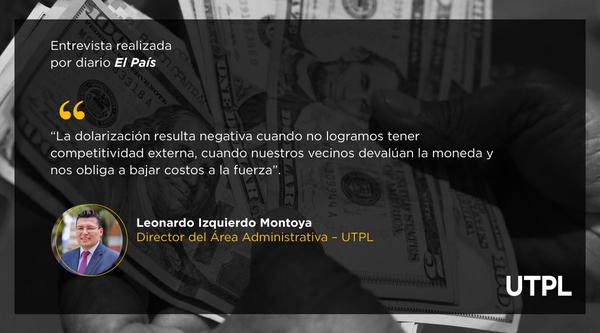Dollarization in Ecuador, a corset that no candidate dares to question
Ecuador tiene una relación de amor-odio con su moneda, el dólar. Por un lado, la dolarización ha permitido controlar la inflación (en 1999, justo antes de la defunción del sucre, alcanzaba el 100%) y ha sido dique de contención contra cualquier aventura que rompa con los libretos de la ortodoxia económica. Por el otro lado, el país ha perdido una herramienta fundamental: no puede emitir billetes ni devaluar. Cuando el déficit se dispara no queda otra alternativa que recortar el gasto o endeudarse. Ecuador es hoy un país rescatado por el FMI. Cada campaña electoral activa la discusión sobre los beneficios o problemas de la dolarización. ¿Es una garantía de estabilidad o un lastre para el crecimiento? El único consenso es que cualquier candidato que insinúe alguna crítica a la dolarización se convertirá ante la opinión pública en un cadáver político.
"Dollarization came as a solution to a monstrous crisis," explains Vicente Albornoz, Dean of Economics of the University of La Américas, based in Quito.“In 1998 they broke four of the big banks and we had 40 years of high inflation.Ecuadorians have that crisis recorded and dollarization came as a solution to the problem.Inflation fell violently in January 2003 and since 2015 is close to zero.Dollarization is tremendously popular, any candidate who speaks against will be destroyed, ”summarizes Albornoz.Former President Rafael Correa (2007-2017) was always aware of it.When he had been a critic of dollarization for two years of government.As an economist, he said that he had been "the worst technical-economic absurdity that has been carried out in the country", but immediately admitted that "getting out of dollarization is tremendously chaotic"."Then," he admitted, "we have decided to keep it".
Leonardo Izquierdo Montoya, dean of the Faculty of Economic Sciences of the Private Technical University of Loja, says that the beginning of dollarization produced an “impressive loss in thousands of families, who became poorer”.But consider that, over the years, the balance is positive.“We have inflationary control and, above all, confidence in the currency.Another issue is macroeconomic stability, because a stable currency allows you to project in the long term ”.Albornoz adds a political dimension to the analysis of costs and benefits."It forces us to have a discipline," he says, "if we did not have it, after 10 years of Correa we would be in a situation similar to Venezuelans.Dollarization is a blockade of the temptations of the deficit without limits ”.

The problems begin, precisely, when the country cannot enter the dollars it needs to finance its expenses.Izquierdo Montoya says that the country is obliged “to export more than it matters, because it cannot print currency.Dollarization is negative when we fail to have external competitiveness, when our neighbors devalue the currency and force us to lower force costs, ”he explains.Ecuador closed 2020 with a public deficit of 6.900 million dollars, equivalent to 7% of GDP.But without emission or devaluation, the only way to cover that fiscal red is with unpopular adjustments or with external loans.
I added a video to @youtube playlist https: // t.CO/CXJ4FBQATD How to Make Vanilla Cup Cake Using Pressure Cooker (Without Using Oven)
— Vasudevan Swaroop Krishnan Fri Jan 06 17:49:23 +0000 2017
This year, the IMF went out to the rescue of Ecuador with a loan of 6.500 million dollars, a figure that rises to 7.400 million when other multilaterals are added.Last year, Lenin Moreno's government agreed to postpone debt payments four years.However, Ecuador will be, according to the forecasts of the World Bank, the one that will take, together with Argentina, to recover the pre -crisis values: until 2024, two years more than the rest of the countries in the region.The scenario that awaits the new president is not the best.Poverty is around 30% and unemployment 5.7%, a figure that hides that only 34% of Ecuadorians earn the 400 dollars needed to have what is considered an "adequate employment".The salary average of Ecuadorians barely exceed $ 300.In contrast, the basic family basket -which includes food, clothing, housing and services for a family of four members ”is 712 dollars.The vital basket, which contemplates less item, is also superior to salaries: 501 dollars.
"Dollarization was a serious mistake, it was an IMF experiment," says the Argentine economist Matías Vernengo, a professor at Bucknell University from the US.“Ecuador does not have a good time, because dollarization prevents him from having accumulation in domestic currency and hinders the old national development project;But you can't get out of it, ”he admits."One of the possible ways is to make social programs in a currency issued by the National Government, a fiscal dollar that can fluctuate," he explains.Thus we arrive until the tiebreaker this Sunday, when two candidates in the ideological antipodes will fight for the presidency.
Andrés Arauz, Correa's political dolphin, has insisted during the entire campaign with which it will not leave the dollarization if it reaches Carondelet."It will continue and strengthen.We are going to export more, to generate greater consumption of the Ecuadorian product and to preserve and encourage that dollars remain in Ecuador, ”he repeated.The liberal Guillermo Lasso is a fierce defender of dollarization.Lasso promotes greater economic opening and even reducing the 5% tax that taxes the exit of dollars outward to the outside.In any case, neither dares to question the model.Your voters would not forgive it.
Suscríbase aquí a la newsletter de EL PAÍS América y reciba todas las claves informativas de la actualidad de la región.










Related Articles